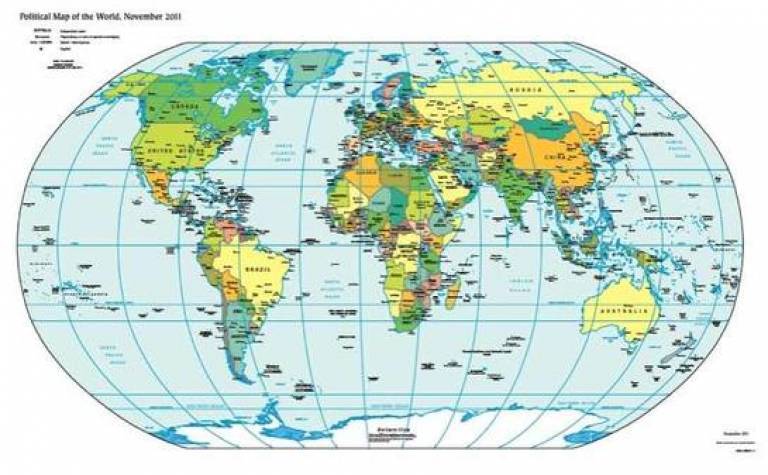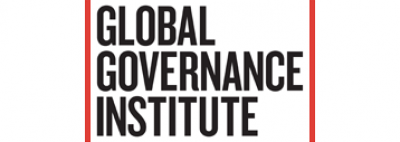Cartographies of Power: Situating the Role of the Law
13 April 2016
Naseer Chia (MSc Global Governance and Ethics) on a GGI keynote lecture with Professor David Kennedy.

The Global Governance Institute (GGI) was delighted to welcome Professor David Kennedy, Manley O. Hudson Professor of Law and Faculty Director of the Institute for Global Law and Policy at Harvard Law School, as the keynote speaker of the GGI's two day conference on global governance held in November 2015.
While traditional international relations theory conceives of international affairs as a system or global order, structured by the balance of power, Professor Kennedy's talk 'Law and Distributive Struggle in Global Political Economy' sought to reconceptualise political and economic life as a terrain of perpetual struggle, in which the interactions and conflicts between actors at all levels shape our world.
Professor Kennedy argues that the notion of global governance signals a utopian dream; a dream that a disorderly world can be made more orderly by aggregating the efforts of institutions such as the World Trade Organisation, the European Union, large NGOs, national governments and corporations to solve complex global problems. He advocates replacing the search for 'global governance' with an effort to map the cartography of power through which political and economic gains are distributed, and sees law as the gateway to that analysis. Prof. Kennedy suggests suspending the common assumption that law is separate from society, bestowed from above onto the people in order to regulate the international system into some form of global legal order. Instead, law should be understood as a malleable and elastic tool, arising from interactions between people making claims against one another in a terrain of struggle. In his formulation, law is not an instrument of governance, but a distributive tool that allocates and protects gains from political and economic interactions.
The pillars of the global political economy, from capital and labour to sovereignty and rights, are products of law. The international community's response to the global financial crisis has been to advocate for, and in some cases enact, more stringent financial regulation. The global tax regime is constructed through a mix of national and international regulations. The 'Responsibility to Protect' doctrine and general legitimacy of warfare are framed in relation to international law. Prof. Kennedy argues that these arrangements are all conjured by legal contestation, an iterative affair in which each actor engages the battle with different strengths and fights for gains to proceed to the next round of interactions. Political power and economic gains do not cascade down from a sovereign or arise from an individual right, but are rather products of struggle.
Law's distributive role is no surprise to transnational actors, who work hard to exploit laws and shape the regulatory regime according to their outcomes and practice. Corporations and governments engage in forum-shopping, searching for the most favourable regulatory jurisdiction for their desired ends. However, law can also distribute where there are no regulatory norms. The malleability and plasticity of law provide an avenue for actors to frame their interests as legal rights, and it is in this landscape that an army of technocrats - specialist international lawyers - gain such prominence, fighting as they do to gain advantage and reframe the narrative in favour of their business, political or non-governmental clients in the struggle. This can lead to an unequal distribution of gains in the struggle.
Prof. Kennedy's thesis is at its strongest when he notes that law has the social power to legitimate outcomes; convincing actors that a particular outcome is 'legal' creates a feeling that it should be accepted. Warfare illustrates this well. In advance of military interventions - such as the recent interventions in Libya and Syria, or the 2003 Iraq War - the intervening actors took great care to frame their action as legal in terms of international law; a failure to do so would render their conduct illegitimate. The international law of warfare also serves as an example of the malleability of law. Legal scholars such as Fernando Tesón (2001) and Allen Buchanan (2003) reject the sanctity of international law. Buchanan (2003) advanced "Illegal Legal Reform" as a justification for humanitarian intervention, noting that NATO's actions in Kosovo in 1999 may well have been considered strictly illegal under international law, but were necessary as a means of reforming the international legal system; the 'responsibility to protect' doctrine is now a legitimate, key cornerstone of the international legal framework.
Prof. Kennedy is right to emphasise law's distributive role, and to suggest that actors traditionally seen as more powerful, either militarily or financially, are unable to simply rely on that hard power. The recent successes of an individual farmer in the Lahore High Court in Leghari v. Federation of Pakistan, a group of children in the federal District Court of Eugene, Oregon in Kelsey Cascadia Rose Juliana, et al. v. United States of America, and most famously, an NGO in the District Court of the Hague in Urgenda Foundation v the State of the Netherlands, show how civil society has utilised litigation to assert their environmental rights against federal governments. The recent release of the 'Panama Papers', in which a whistleblower's leak of documents evidence allegedly illegal or illegitimate exploitation of offshore tax regimes by public individuals and political leaders has to date led to the resignation of a Head of State and placed severe political pressure on many others. It shows how law can be deployed in the struggle to redistribute political gains between traditionally powerful and less powerful actors, and how conflict and struggle now takes place in multiple fora, with data servers and the internet now contested terrain. Prof. Kennedy is also right to focus on the plasticity and manipulation of law as a legitimising mechanism. The reframing of torture, an illegal activity, as 'enhanced interrogation techniques against non-privileged combatants' serves as a salient example.
Nevertheless, it may be premature to discount the existence of a global order in which strong nations and institutions engage in the struggle with greater resources and power. Kiribati, a Pacific Island nation at immediate and grave risk of flooding as a result of climate change, may well cite international law and the provisions of the environmental agreement reached at last year's 21st Convention of the Parties in Paris (COP21) as being in its favour, granting its position normative legitimacy. However, it is ultimately relatively powerless in curbing the rising carbon emissions of the United States or China. The Kyoto Agreement, a binding treaty of international law, proved to be ineffective once the largest powers decided against ratifying it.
In the field of gender violence, both hard law and soft law have been enacted with the aim of eradicating gender inequality and ending sexual violence against women. In 1979, the UN General Assembly passed the Convention to Eliminate All Forms of Discrimination against Women. In 2000, the UN Security Council adopted Resolution 1325, imploring states to specifically consider the role of women in peacebuilding, and to protect women and girls from sexual violence. Nevertheless, the gender pay gap is still lamentably prevalent (at last count - 13.9% among full time workers in the UK), and in many states, sexual violence remains an institutional epidemic and tool of war. In Nepal, for example, advocacy groups have highlighted the lack of prosecution for the widespread occurrences of sexual violence perpetrated by the military, many of whom are UN peacekeepers, attributed to the intimidation of witnesses, the lack of access to lawyers and justice, and a 35-day limitation period for the reporting of sexual violence (Human Rights Watch, 2014). Here, a combination of hard and soft law, with clear binding rules and enforcement mechanisms, has been blunted by a lack of implementation due to asymmetric power structures.
Prof. Kennedy's thesis is provocative and provides much food for thought. Academics and policy makers should be minded to conceive of law as a distributive tool, and to formulate a research and policy agenda on how law can be best deployed to temper or reverse the most perverse effects of inequality. However, it may be premature to discount the existence of a global order defined at least in part by balances of power. Intuitively, it seems plausible to conceive of a form of global governance in which powerful actors and institutions wield power, and in which law is used as a tool by the same actors and institutions as a means of gaining advantage or legitimising their positions.
Global governance remains a contested concept, analogised by Weiss and Wilkinson (2014) to Lewis Carroll's Cheshire Cat: "a grinning head floating without a body or substance", and need not mean a utopian ideal where institutions group together to solve complex, transnational problems. This analytical state of flux motivates Coen and Pegram's (2015) call for a third generation of global governance research "distinguished by a concern for the complexity and dynamism of global public policymaking and delivery in the new century". Ultimately, following Cox (2013), global governance as a discipline seeks to formulate a critical theory accounting for the "continuing process of historical change". In seeking to map the cartography of power through which political and economic gains are distributed, Prof. Kennedy may well be using law as a gateway into the same struggle.
Naseer Chia is a student on the MSc Global Governance and Ethics programme and is also a qualified lawyer. Views are his own and not those of the Global Governance Institute.
References
- Buchanan, Allen (2003). Reforming the international law of humanitarian intervention. In: J. L. Holzgrefe and Robert O. Keohane (eds.) Humanitarian Intervention (Cambridge: Cambridge University Press), pp. 130-174.
- Cox, Robert W., 'Critical Theory', in: Thomas G. Weiss and Rorden Wilkinson (eds.) Global Governance and International Organizations (London: Routledge, 2013).
- David Coen and Tom Pegram, 'Commentary - Wanted: A Third Generation of Global Governance Research', Governance, November 2015.
- Fawcett Society, 'The Gender Pay Gap: Facts, Causes and Solutions', March 2016. Available here: http://www.fawcettsociety.org.uk/wp-content/uploads/2016/03/Gender-Pay-Gap-Briefing-2016.pdf
- Human Rights Watch, 'Nepal: Conflict-Era Rapes Go Unpunished', 23 September 2014. Available here: https://www.hrw.org/news/2014/09/23/nepal-conflict-era-rapes-go-unpunished
- Tesón, Fernando R., The Liberal Case for Humanitarian Intervention (November 2001). FSU College of Law, Public Law Research Paper No. 39
- Thomas G. Weiss and Rorden Wilkinson, 'Rethinking Global Governance? Complexity, Authority, Power, Change' (2014), International Studies Quarterly, vol. 58, 2014.
Case Law
- Ashgar Leghari v. Federation of Pakistan (W.P. No. 25501/2015), Orders of 4 and 14 September 2015
- Kelsey Cascadia Rose Juliana, Xiuhtezcatl Tonatiuh M. Et Al. v. United States, Barack Obama et al., No. 6:15-cv-01517-TC, Order of 8 April 2016,
- Urgenda Foundation v the State of the Netherlands, C/09/456689 / HA ZA 13-1396, Judgment of 24 June 2015
 Close
Close


